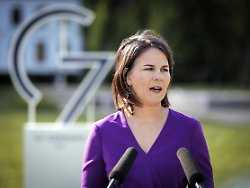bring “grain into the world”.
G7 want to break supply blockade in Ukraine
05/12/2022, 10:09 p.m
Several million tons of grain cannot currently be exported from Ukraine because of the Russian war of aggression. Numerous countries are urgently dependent on the deliveries. Foreign Minister Baerbock wants to find a solution together with her G7 colleagues.
Federal Foreign Minister Annalena Baerbock has warned of a global food crisis caused by the war in Ukraine and promised the world’s poorest countries support from the G7. The “terrible war of aggression” against Ukraine, which violates international law, is “not just a deep crisis for all of Europe” but a “global” crisis, said Baerbock at the start of the G7 foreign ministers’ meeting in Wangels, Schleswig-Holstein. The war in Ukraine is blocking the export of millions of tons of grain vital to the people of the Middle East and Africa.
The Russian war of aggression is “also a war against the international order, against international cooperation,” said the Green politician. The aim of Russian President Vladimir Putin is to use his war of aggression against Ukraine to “divide the world community”. But the G7 will not allow this. The group of leading industrialized nations assumes its responsibility and will ensure that the 141 states that condemned Russia’s war of aggression against Ukraine in the United Nations “are not now abandoned,” said Baerbock. In addition to ensuring food security, it is also about the energy supply of the countries.
The Green politician emphasized the importance of Ukraine as a grain exporting nation and referred to the “25 million tons of grain” that are currently “blocked” in the Ukrainian port of Odessa in particular. Together with her G7 colleagues, she will discuss solutions to “bring the grain into the world,” said Baerbock.
The G7 foreign ministers will meet at Schlossgut Weissenhaus in Wangels until Saturday under the German presidency. In addition to Germany, the group includes the USA, Great Britain, France, Canada, Italy and Japan. US Secretary of State Antony Blinken had canceled his participation in the G7 meeting due to a corona infection that had now been overcome. According to his ministry, however, he is expected to attend the NATO foreign ministers’ meeting in Berlin at the weekend.
Visit of Ukraine’s foreign minister
Ukrainian Foreign Minister Dmytro Kuleba and his Moldovan counterpart Nicu Popescu are guests at the G7 foreign ministers’ meeting in Wangels. The Indonesian Foreign Minister Retno Lestari Priansari Marsudi, whose country currently holds the G20 Presidency, will also be connected via video. Kuleba had said on ARD that morning that he also wanted to use his visit to Germany to promote talks about his country’s application for EU membership.
With a view to the question of how the international community can support Ukraine in the face of the “brutal Russian war of aggression”, the G7 are currently coordinating “every day”, said Baerbock. The Foreign Minister stressed that Ukraine’s “defense capability” was the focus of these considerations. Their most recent talks in Kyiv were also about how support for Ukraine could be structured “without contributing to NATO becoming a participant in this war.”
The situation in the Republic of Moldova, which borders Ukraine, is also a central topic of the deliberations of the G7 ministers. Internationally, there are fears that the war will spread to the small country in the east of which is the Russian separatist-controlled region of Transnistria. Baerbock said the danger that the war could spill over into Moldova was “very, very great at the beginning of this war”. In the meantime, the “highly fragile” situation in the country could “be stabilized somewhat” with international support. Baerbock launched a support platform for Moldova in March, which aims to promote the resilience and stability of the south-eastern European country.
